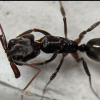Hello all,
I don't know if some of you remember or not but I captured some trap jaw ants this past summer while at work (came in a shipment of potted house plants). They are doing well and I think there might be a queen. Knowing these ants came from florida I'm not sure how to overwinter them. I know temps can dip down around the Orlando, Fl area in January so not sure if I should put them in the wine cooler with the rest of the ants or leave their container out at room temperature for the winter or keep a heat cable on them????
















